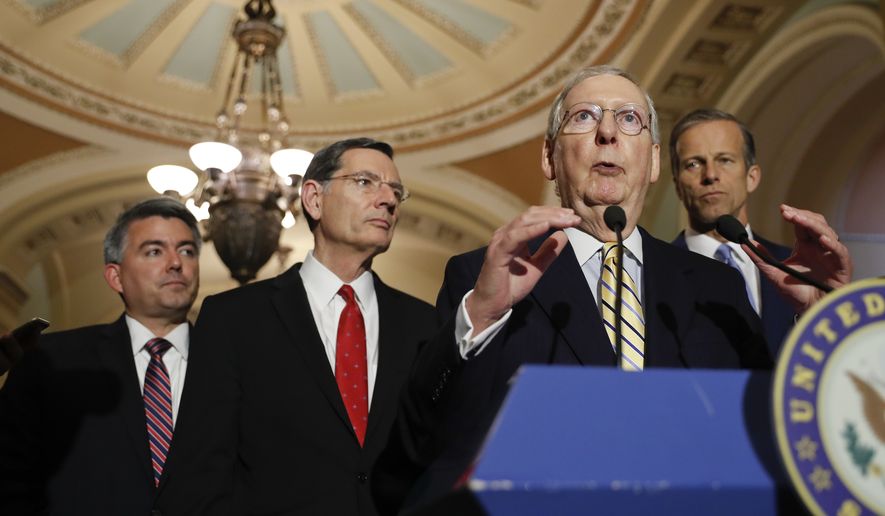Republicans’ test-drive of a little-used regulatory review law is now over and party leaders say it was a smashing success, allowing Congress roll back 14 rules President Obama’s team issued at the end of his administration, for a savings of billions of dollars.
The window for using the Congressional Review Act (CRA) to unravel Obama-era regulations closed last week, and the tool — which had previously been used just once, to attack a Clinton administration rule — has dominated the early going in the Trump administration.
Obama rules including: teacher training, coal mining runoff and bear hunting in Alaska, have now been erased from the books, and, according to the terms of the CRA, they can never come back in the same form, no matter what a future administration wants.
“We’ve begun chipping away at policies that have hurt the middle class and forbidden economic growth for far too long,” Senate Majority Leader Mitch McConnell said, during a victory lap last week.
The CRA allows Congress to go back and attempt to repeal rules adopted within the last 60 days that Congress is in session. Given last year’s election and other vacations, that meant any rules back to the middle of June were fair game for overturning.
The rules are also streamlined, requiring just a majority vote to pass in both the House and Senate — meaning the GOP was able to avoid a Democratic filibuster.
Republicans were successful in 14 of their 15 attempts. Their final attempt, an effort to roll back a methane emissions rule that dings oil and gas production on federal lands, fell through after Sen. John McCain, Arizona Republican, surprised his party leaders by voting against the repeal.
Liberal advocacy groups cheered that victory and sighed in relief over some of the rules that escaped the ax, including consumer protection rules.
Senate Minority Leader Charles E. Schumer dismissed the GOP’s regulation rollback, saying it was no substitute for a real agenda, which, he said has been lacking so far in the Trump era.
“The fact that they are bragging about these highlights how little else they have accomplished legislatively,” he said.
He and fellow Democrats said that instead of unleashing the economy, the rollbacks were payoffs to certain GOP-friendly industries: “They are giveaways to Big Oil, Big Gas, Big Coal, Big Mining and wealthy special interests.”
The American Action Forum, a conservative-leaning think tank, calculated repealing the rules could save the economy millions of hours of paperwork and $3.7 billion in regulatory costs to the federal agencies, and perhaps $35 billion in compliance costs for industry.
The biggest savings came from what was known as the Stream Buffer Rule, which imposed strict controls on runoff from surface coal mining, and which critics said could have cost the industry one-third of its jobs.
Sam Batkins, director of regulatory policy at the AAF, said that could put the U.S. on track for a net negative year in terms of regulatory burden. He said in the more than a decade for which he has data, that’s never happened.
He said going into this year, Republicans had hoped for between six and 12 rollbacks.
“To get to 14 was at the upper end of everybody’s prediction,” he said.
Mr. Batkins also said rollback was also not an indiscriminate culling. Just three of the 14 rules were deemed “major.”
The CRA was written by Congress in the 1990s and signed into law by President Clinton. Before this year it had only been used successfully once, by Republicans in 2001 to overturn a workplace-ergonomics rule issued by the Clinton administration.
Success requires a willing president and Congress, which means by its nature it’s most likely to be used when there’s a change of parties in the White House.
The GOP’s broad use of the law this year will likely force changes in the way presidents operate in the future, analysts said, forcing them to push out regulations earlier in their terms so they aren’t subject to the look back.
Amit Narang, a regulatory expert at Public Citizen, said he hopes Congress is the one that changes by repealing the CRA.
“We just do not need to give Congress this shortcut to kill regulations that protect the public, at corporate interests’ behest,” he said. “This shortcut is unnecessary, it’s arbitrary in many respects. This law needs to go.”
He said it takes agencies an average of four years to finalize major rules, so they aren’t rushing them out the door at the end of a president’s term.
Under the CRA, agencies cannot issue new rules that are substantially the same as the ones Congress has repealed. But what that means in practice is difficult to say, since the CRA has only been used once before and no one has had to grapple with an agency’s attempt to reinstate a regulation.
The first test case could come soon.
One of the rules repealed this year was issued by the Securities and Exchange Commission, which was required to write the rule under the 2010 Dodd-Frank Wall Street overhaul law. The requirement in the law still remains — but the SEC will have to figure out how to rewrite the rule in a way that doesn’t clash with the CRA.
• Stephen Dinan can be reached at sdinan@washingtontimes.com.




Please read our comment policy before commenting.